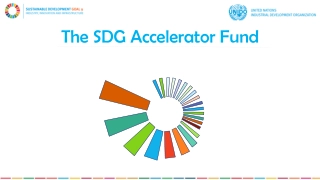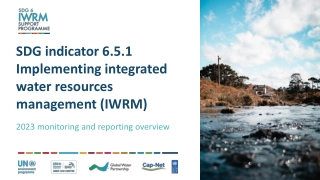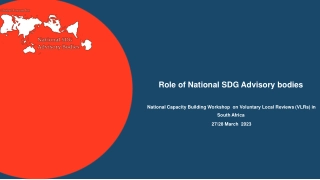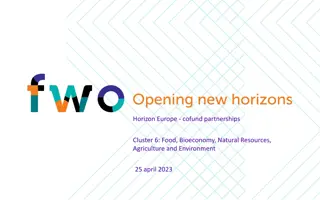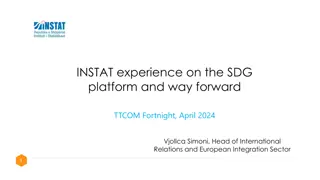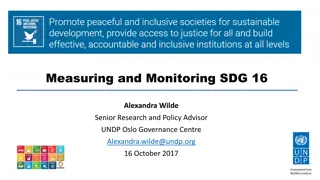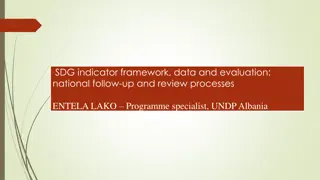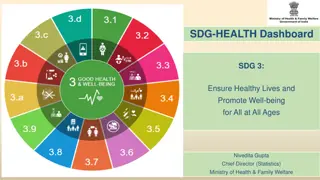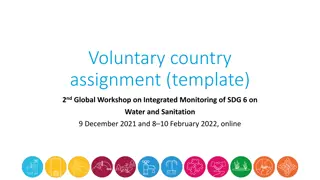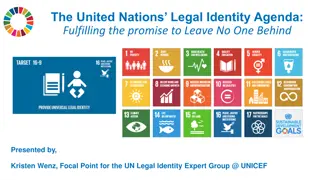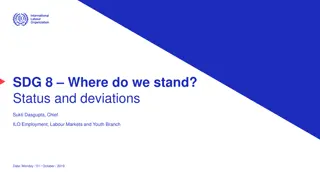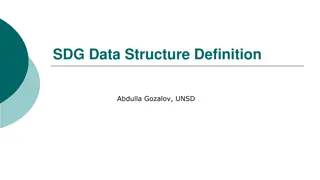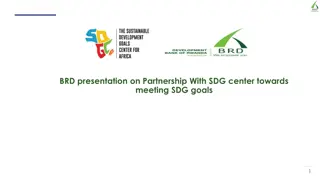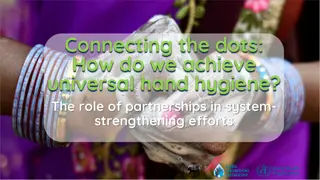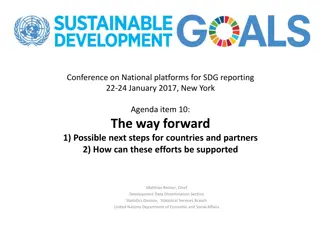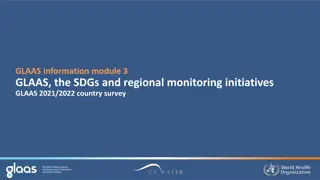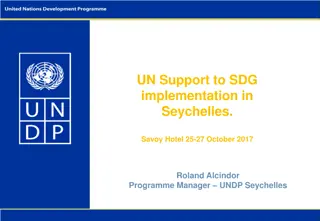
Achieving Common of SDG Partnerships
SDG Partnerships play a crucial role in achieving sustainable development goals. This webinar explores what SDG partnerships are not and what they are, emphasizing the importance of multi-stakeholder involvement and alignment with UN values. It delves into success factors of MSPs, architecture for accountability, transparency, and the promotion of a nexus approach in partnership initiatives. The discussion highlights the need for differentiation between partnership types, focus on country-level partnerships, and enhanced mapping of initiatives through platforms like Partnerships for SDGs.
Download Presentation

Please find below an Image/Link to download the presentation.
The content on the website is provided AS IS for your information and personal use only. It may not be sold, licensed, or shared on other websites without obtaining consent from the author. If you encounter any issues during the download, it is possible that the publisher has removed the file from their server.
You are allowed to download the files provided on this website for personal or commercial use, subject to the condition that they are used lawfully. All files are the property of their respective owners.
The content on the website is provided AS IS for your information and personal use only. It may not be sold, licensed, or shared on other websites without obtaining consent from the author.
E N D
Presentation Transcript
Second SDG Partnerships Webinar: Subtitle
A quick review of what are NOT and WHAT ARE SDG partnerships SDG Partnerships are NOT Private Public Partnerships SDG Partnerships are NOT individual organizations voluntary commitments SDG Partnerships are NOT general partnerships for sustainable development SDG PartnershipsARE partnerships that are linked to at least delivering one of the SDGs SDG Partnerships ARE multi- stakeholder SDG Partnerships ARE inline with the UN values 2 July 22, 2012 Footer text here
Achieving a Common Understanding of Partnerships 1. UN lead a multi-stakeholder partnership e.g. Sustainable Energy for ALL 2. Multi-stakeholder partnerships that involve the UN e.g. GAVI (Global Alliance for Vaccines and Immunisation) or GRAIN 3. Multi-stakeholder partnerships that do not involve the UN 3 July 22, 2012 Footer text here
Success factors of MSPs A learning culture in our approach to partnerships Promoting integrated (cross-sectoral or nexus) approaches in MSPs Strong and effective leadership Strong governance processes, Process management including conflict mediation, An independent and well staffed secretariat Adequate funding and resource management Good capacity building for partners 4 July 22, 2012 Footer text here
Architecture for Accountability, Transparency, Due Diligence, Monitoring and Review Accountability and transparency Roles of intergovernmental bodies, the UN system and other fora UN system coordination Principles, Guidelines, and Due diligence Monitoring and Mapping Reporting Review 5 July 22, 2012 Footer text here
Summary of key ideas and proposals 1. A nexus approach should be promoted by the UN and applied by MSPs, reflecting the cross sectoral nature of the 2030 Agenda. 4. The differentiation between different types of partnerships needs to be further defined and clarified as a first step. 5. The GA resolution on Towards Global Partnerships could broaden its focus beyond partnerships with the private sector to also include academia, NGOs, philanthropy and other stakeholders. 2. More focus is needed on MSPs at the country-level and MSPs in LDCs and other countries in special situation need to be encouraged. 3. UNDESA could take the lead in mapping partnership initiatives, supported by the Global Compact. The online platform Partnerships for SDGs should be improved, including search functions and regular updates. 6. More coordination across the UN system is necessary. A network of multi- stakeholder focal points could be established and could be involved in the preparation of the ECOSOC Partnership Forum. 6 July 22, 2012 Footer text here
Summary of key ideas and proposals 7. The UN system needs to ensure that principles and guidelines established are respected. There might be a role for the QCPR to set a minimum set of guidelines for the UN s engagement with partners at the national level. 8. A coherent and strengthened due diligence procedure should be established. A first layer could be to centrally endorse throughout the system a set of overarching guidelines for partnerships, building on already existing guidelines and language from A/RES/70/224. It could specifically also make signing onto the Global Compact principles a requirement for business engagement with the UN. A second layer could complement these guidelines by sector specific guidelines endorsed by specialized agencies. 9. Intergovernmental fora can and should complement each other, rather than creating parallel structures. There should be specific and complementing roles for the GA, ECOSOC and the HLPF as reflected by existing mandates. The various executive boards of funds and programmes could also play a role in providing guidance on MSPs involving the UN organizations over which they have oversight. 10. Leading to the HLPF, a coherent process of review should be put in place, based on the suggestions for monitoring and review. ECOSOC should lead this process. 7 July 22, 2012 Footer text here
Summary of key ideas and proposals 11. A central reporting mechanism could be established, distinguishing between different types of partnership, with distinct requirements for UN-led partnerships. Reporting should be aligned with guidelines and principles. For mega partnerships, internal monitoring and review mechanisms could be complemented by independent reviews/audits. 12. For partnerships registered on the Partnerships for SDGs platform, a lighter reporting process should be put in place, with the option to follow-up and review the listing, but this might require off-line resources. 13. The Global Compact s communication on progress reporting requirements could be further aligned with the SDGs and discussed at the Partnership Forum. 14. A role for independent or expert bodies should be considered in providing expertise and assistance to intergovernmental fora or the UN system in their monitoring and review of MSPs. 15. Major groups and other stakeholders should have a role in promoting transparency and accountability. 16. A proposal was made to showcase Champion partnerships at the ECOSOC Partnership Forum as positive examples for other MSPs. It was also felt that there is a need to establish safe spaces for sharing negative results and to promote learning from failure. The Partnership Forum could also be that space. It could also be a creative space to explore new ideas and trends in MSPs. 8 July 22, 2012 Footer text here
What you can do in the google document: Dialogue Note 1: 1. What does it take to galvanize new cross-sectoral partnerships? 2. What are possible incentives that would promote and encourage existing partnerships to utilize crosssectoral approaches? 3. What are the elements of an enabling environment for cross- sectoral multi-stakeholder partnerships? 4. What institutional arrangements are needed for the United Nations to fully and efficiently support Member States in cross- sectoral multi-stakeholder partnerships? 5. What are the lessons learned from multi-stakeholder partnerships that have successfully leveraged (or who are committed to leveraging) cross-sectoral approaches to achieve 6. How can we design cross-sectoral multi-stakeholder partnerships to effectively leverage integrated or nexus approaches to support the implementation of the 2030 Agenda for Sustainable Development? 7. What type of monitoring, reporting, and evaluation mechanisms could be used for cross-sectoral multi-stakeholder partnerships? 9 July 22, 2012 Footer text here
What you can do in the google document: Dialogue Note 2 1. How can the UN system strengthen coherence and coordination of UN-led multi- stakeholder partnerships? What are the additional challenges involved in ensuring the transparency and accountability of cross-sectoral multi-stakeholder partnerships, and how can these be addressed? How can multi-stakeholder partnerships involving the United Nations be more transparent and accountable? How can the UN improve its due diligence, monitoring and review of its partnerships that contribute to the implementation of the 2030 Agenda? What kind of reporting would be appropriate for different types of partnerships? How can the existing reporting requirements be aligned with UN partnership guidelines and principles? What types of partnership models have been successful in establishing clear monitoring and review policies? What are some best practices that can be highlighted? How could the role of Member States in reviewing and monitoring multi-stakeholder partnerships implementing the 2030 Agenda be enhanced to ensure the reputational integrity of the United Nations in such partnership initiatives? What could be the division of labour on the review of partnerships of the General Assembly, ECOSOC and the High-level Political Forum under the auspices ECOSOC and the General Assembly? 2. 3. 4. 5. 6. 7. 8. 10 July 22, 2012 Footer text here
Now its upto you https://docs.google.com/document/d/1ZdiKXYdexpFtLNa1QvyJ- edCmxxahQKYw6f7UuHDnuw/edit
12 July 22, 2012 Footer text here
13 July 22, 2012 Footer text here
14 July 22, 2012 Footer text here
15 July 22, 2012 Footer text here
16 July 22, 2012 Footer text here

